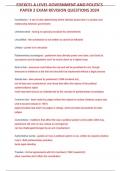EDEXCEL A LEVEL GOVERNMENT AND POLITICS PAPER 2 EXAM REVISION QUESTIONS 2024 Constitution - a set of rules determining where ultimate power lies in a system and relationship between government Unentrenched - having no special procedure for amendments Uncodified - the constitution is not written so cannot be followed Unitary - power is in one place Parliamentary sovereignty - parliament has ultimate power over laws, can't bind its successors and its legislation can't be struck down by a higher body Rule of law - everyone must follow the rule and will be punished for not, though everyone is entitled to a fair trial and shouldn't be imprisoned without a legal process Statute law - laws passed by parliament (1998 scotland act) not all laws are constitutional, only those that affect the nature of the political system/citizens rights most important source as underpinned by the concept of parliamentary sovereignty Common law - laws made by judges where the original is unclear (habeas corpus was until it became statute in 1967) legal principles laid down by judges in rulings, which provides precedents for later judges Conventions - traditions that affect the way a political system works (after 2003 iraq, parliament will vote on war unless an emergency) can be challenged/changed by an act of parliament Authoritative works - guides on how a political system is run, written by experts (erskine may's 1844 parliamentary practise) lacks legal standing Treaties - formal agreements with EU members (1992 maastricht) other countries don't affect the constitution Devolution - dispersal of power, but not sovereignty, within a political system Magna carta - written in 1215, said that no one should be deprived of liberty or property without due process of law, though most has been repealed Bill of rights - passed by parliament in 1689, included regular parliaments, free elections and freedom of speech within parliament Act of settlement - 1701, established the right of parliament to determine the line of succession to the throne Act of union - 1707, united england and scotland who had shared a monarch since 1603 but not parliaments Parliament act 1 - 1911, lords could not delay money bills and had a 2 year delay for non financial bills Parliament act 2 - 1949, reduced the 2 year delay in the lords to 1 The european communities act - 1972, took the uk into the eec and eu law would be sovereign over uk For a codified constitution - one source so is easier to learn, helps check the power of the executive, unusual to not be codified, supreme court can't declare laws unconstitutional, it should be more difficult to amend to fit its importance For an uncodified constitution - flexibility would be lost, leads to judicial activism House of lords act - 1999, removed all but 92 hereditary peers Removal of peers - ended conservative dominance, gave the lords a modern appearance, majority were now nominated due to merits House of lords appointment commission - established may 2000, recommends 2 people a year to be crossbenchers and vets most other nominations for lords Scottish devolution referendum - september 1997, 75% yes, 25% no, 60% turnout Welsh assembly referendum - september 1997, 51% yes, 49% no, 50% turnout Good friday referendum - may 1998, 71% yes, 29% no, 81% turnout West lothian question - scottish MPs at westminster could vote on purely english matters, but english MPs couldn't vote on scottish matters The barnett formula - determines relative levels of public spending for parts of the UK based on population, meant that devolved bodies receive more North east assembly referendum - 2004, 78% no, 22% yes, 48% turnout Human rights act - 1998, incorporated ECHR into statute law, ensuring a right to fair trial, freedom from slavery, etc and all future legislation has to be compatible Limitation of HRA - the government declared and exemption from article 5 (right to liberty and security) in cases of suspected terrorism Creation of the supreme court - 2005 constitutional reform act led to establishment in 2009, took over from law lords Scottish devolved powers - education, justice, housing, police, fire, vary income tax by 3p, drink driving limits Number of MSPs - 129, elected every 4 years Welsh devolved powers - culture, education, environment, housing, transport, health, language Number of welsh members - 60 Irish devolved powers - education, welfare, transport, justice, reserved matters including financial, broadcasting, firearms Advantages of devolution - one region doesn't represent everyone, brings decisions closer to the people, solves west lothian question allows cultural identity, makes decisions based on consensus, system can evolve Disadvantages of devolution - little public want for regional assemblies, political parties have to fight harder,




